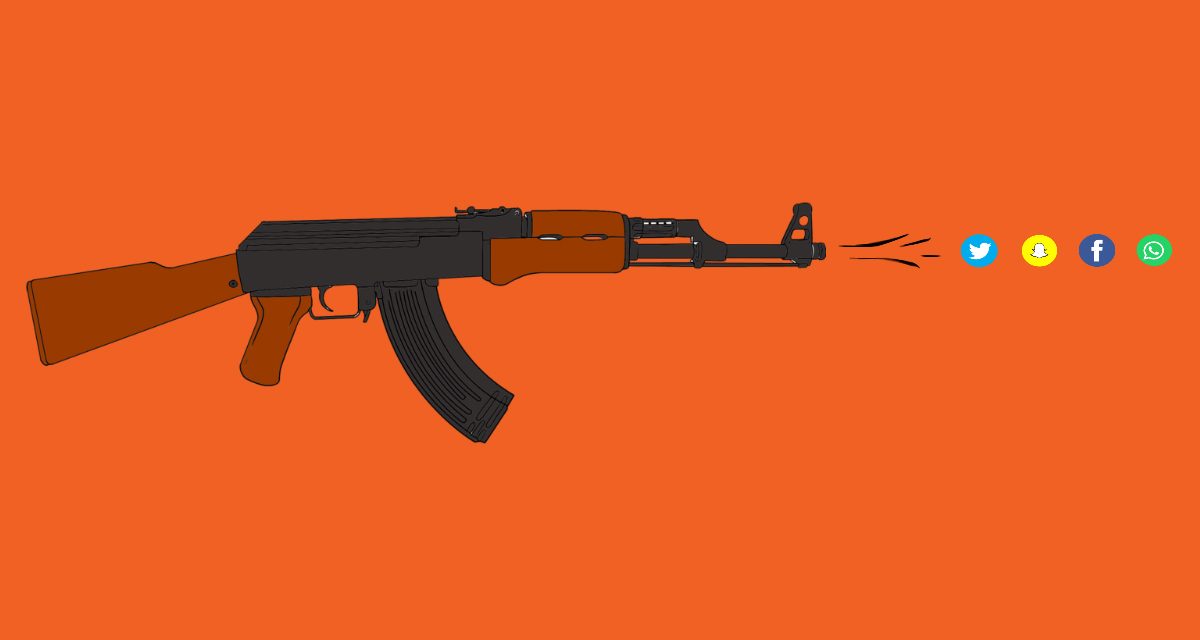P.W. Singer and Emerson T. Brooking, LikeWar: The Weaponization of Social Media (Houghton Mifflin Harcourt, 2018)
In the mid-90s, the think tank circuit was abuzz with the concept of “revolutions in military affairs.” The central idea was that at key points in history, technological innovations with broad societal impact spurred subsequent revolutions in military capability. The advent of rail transport coupled with conscription enabled mass mobilization. The emergence of the telegraph allowed for near-simultaneous communication and the ability to closely coordinate and synchronize large military operations. Fusion of the internal combustion engine with mass-production led to the mechanization of warfare in the twentieth century. The invention of the integrated circuit chip heralded the digital age that fostered precision weaponry. As mankind approached Y2K, many of those same theorists were pondering the future: Where would the information take us?
In LikeWar, authors Peter Singer and Emerson Brooking seek to answer that question. In the classic sense of the term, the information age has seemingly ushered in a new revolution in military affairs, but one unlike any seen before. Initially, their treatment of social media is reminiscent of the think tank buzz of the 90s, with much of the discussion focused on its broad societal impact. The authors explore the history of the Internet (with an obligatory nod to the now-infamous 1994 exchange between Bryant Gumbel and Katie Couric), tracing the evolution of social media from its earliest days to the megalithic entity it represents today. Along the way, they firmly establish the tenets of effective social media—narrative, emotion, authenticity, community, and inundation—behind the campaigns that we consume so readily.
LikeWar is an eye-opening literary experience. Most of us access social media in some form on a near-daily basis, but do we really understand the phenomenon? Recent evidence suggests that we do not, and Singer and Emerson present a provocative case for the inherent dangers of “digital wildfires” in the midst of “emotional contagion.” From the “work-from-home Sherlock Holmes” to the “end of secrets” social media invades the very fabric of our existence. On any given day, we bear witness to online behavior that borders on sociopathic; in the Twitter-sphere, reason has given way to rage. Social media has obliterated the norms and barriers that once separated people: on any given day, ordinary citizens can interact with celebrities, politicians, and even terrorists in a way hitherto unimagined. No one can argue that the ubiquitous nature of social media has not revolutionized our access to and ability to exploit information.
But has the emergence of social media transformed warfare? While there is little doubt that it has influenced the landscape of conflict—the book’s vignettes on ISIS and the defense intelligence community offer compelling examples—the broader question of a revolutionary impact on warfare itself remains unanswered, at least for now. That does not mean we are not on the cusp of a revolution in military affairs. In fact, the confluence of social media, next-generation artificial intelligence, and open-source information could, within the coming decade, permanently and fundamentally change the way in which we collect and analyze information. In the same vein, the increased sophistication of the tools of cyber warfare, refined through the exploitation of social media, could soon present an existential threat to the nation-state as we know it today.
Nevertheless, Singer and Brooking offer a convincing, if disturbing, portrait of the pitfalls and potential of social media. LikeWar may not be quite “like” war, but that time might be much closer than we want to admit. However, while there are issues of increasing concern with social media (does, for example, the collapse of norms and barriers threaten a spiral into anarchism and social de-evolution?), we can also foresee the great benefits presented in a medium that unites humanity in a way previously unseen.



“LikeWar” sounds like a book I need to read. Social Media already has a tremendous effect on how we conduct military operations, due to its contribution to “truth decay.” It amplifies our bias by influenceing our emotions. Trust and credibility of information are now even more important in order to exercise military force.
Outside of PSYOP and IO, social media seems like more of a political/grand-strategic tool than a military asset, to me. Those elements (PSYOP & IO) may become more utilized in conventional planning, as social media provides a huge asset – if they can leverage it. However, few other conventional aspects of the way we fight would be able to apply it to any great degree, vice developing better closed-network or secure COMMS.
I may be wrong, but it seems, outside of PSYOP/IO, that social media is better suited as a political tool over a military one.
Two thoughts. First, on the battlefield social media is a vector for transmitting information warfare. It is Psychological Operations at the speed of the internet. This is to be expected.
Second, we often miss the old adages that war is an extension of politics combined with the idea that one of the three pillars of war is the passion of the people. Where Social Media is used directly against the population, bypassing the military altogether, is a type of “war” that we need to come to grips with.
As someone who has been Nuclear Warfare Officer, killed with his bare hands, trained by the Viet-Nam guys, who's first memory is a dream of tanks on a battlefield, and engages in Information Warfare : I think Denial of The Internet will be a massively effective tool in War. We know media itself is a useful tool. What will it be like when we remove it? No ISIS, no Hitler…
In fact we need to prepare for ourselves being denied this.
Take advice from General Mattis and don't dottle on your reading – while you have the chance – if this is to be your career…
"Casino Royale" opening…007 says to "M"…"I'll shoot the camera first next time." And there is an extension here on the body cam of police or citizens filming arrests of friends. A strange thought that war is an INTIMATE act between adversaries and not the business of their citizens. The problem rests here: before there were cameras focused on war, the reporter, the reports could be shaped by patriotism…now they are shaped by what the camera is showing. We have greater accuracy now at the price of less patriotism.
most social media
“LikeWar” sounds like a book I need to read
As someone who has been Nuclear Warfare Officer, killed with his bare hands, trained by the Viet-Nam guys, who's first memory is a dream of tanks on a battlefield, and engages in Information Warfare : I think Denial of The Internet will be a massively effective tool in War. We know media itself is a useful tool. What will it be like when we remove it? No ISIS, no Hitler…
Vevolagu
Impact on socialization Cepeda, after the investigation, concludes that some goods have become representatives of social status, giving expectations to people who consume them on the social scale. This implies that the fact of buying certain goods under a certain brand, socially affects the people who own them, so they can have greater social recognition by showing these purchases in public, classified under some brands.
engages in Information Warf